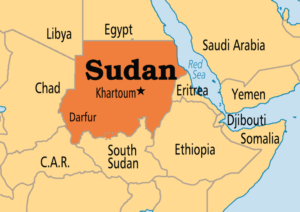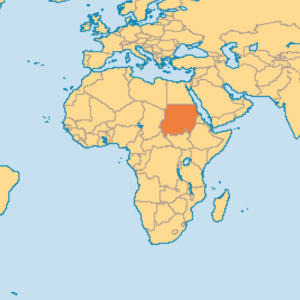NOVEMBER 8 – TODAY’S READING FROM THE ONE YEAR BIBLE- EZEKIEL 18:1-19:14; HEBREWS 9:1-10; PSALMS 106:32-48; PROVERBS 27:10
TODAY’S READING FROM THE OLD TESTAMENT- EZEKIEL 18:1-19:14
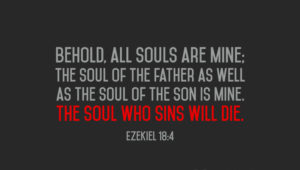 Ezekiel must correct the false outlook that caused many of his day to make excuses for their sin.
Ezekiel must correct the false outlook that caused many of his day to make excuses for their sin.
As we read in a previous chapter, to say “Like mother, like daughter’, is not always a compliment (Ezekiel 16:44).
Sometimes people adopt common phrases to excuse their sin, such as “Well, everyone is doing it.” Or “I can’t help it, that was the way I was raised.” “I can’t help it. It’s the way God made me. I have an Irish temper or an Italian attitude”.
Such was the case in Ezekiel’s day. They interpreted their history as bad karma. People believed that they were being punished for the sins of their ancestors. People were twisting a popular proverb to excuse their own irresponsibility and fatalism.
Ezekiel 18:2 2 “What do you mean by using this proverb concerning the land of Israel, saying, ‘The fathers eat the sour grapes, but the children’s teeth are set on edge’?
Ezekiel’s generation might have misinterpreted what the Ten Commandments taught:
Exodus 20:5b 5 “for I, the LORD your God, am a jealous God, visiting the iniquity of the fathers on the children, on the third and the fourth generations”.
The sins of previous generations do have a destructive influence and often a compounding effect on society. Our disobedience to God can harm our family culture for generations. The choices of David and Solomon severely impacted their immediate family, the future generations, and the nation. But God holds each individual accountable and responsible for their own sins.
There is such a thing as corporate sin when a culture adopts, for example, a lifestyle of idolatry. Ezekiel taught that the destruction of Jerusalem was due to the sins of previous generations. But this was twisted into a sense of irresponsibility and fatalism among the people.
Ezekiel rebukes this excuse-making.
Ezekiel 18: 3 3 “As I live,” declares the Lord GOD, “you are surely not going to use this proverb in Israel anymore.
Some also make the opposite mistake of believing that because their ancestors were righteous that God must treat them as if they were righteous also. “Not so,” says Ezekiel.
Ezekiel 18:4 4 “Behold, all souls are Mine; the soul of the father as well as the soul of the son is Mine. The soul who sins will die.”
Each person has a relationship to God. They are responsible and accountable to God for whether they continue in sin or receive His call to turn and live. Ezekiel then gives examples (18:5-14).
In verse 20, he repeats the bottom line.
Ezekiel 18:20 20 “The person who sins will die. The son will not bear the punishment for the father’s iniquity, nor will the father bear the punishment for the son’s iniquity; the righteousness of the righteous will be upon himself, and the wickedness of the wicked will be upon himself.
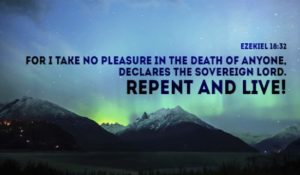 Ezekiel counters any belief in karma or fatalism by showing that God honors a person’s turning away from their sins to a faithful adherence to His Word. The Lord says:
Ezekiel counters any belief in karma or fatalism by showing that God honors a person’s turning away from their sins to a faithful adherence to His Word. The Lord says:
Ezekiel 18:23 23 “Do I have any pleasure in the death of the wicked,” declares the Lord GOD, “rather than that he should turn from his ways and live?”
In the same way, if a person turns away from His righteousness (apostacizes) he will be held accountable- “none of the righteous things he has done will be remembered.”
For those who accuse God of being unfair, the Lord has this to say: “Is it not your ways that are unjust?” (Ezekiel 18:25, 29; see also 33:17).
Even at this late hour in their history of rebellion, the Lord offers His people an escape from the wrathful judgment that is coming.
Ezekiel 18:31-32 31 “Cast away from you all your transgressions which you have committed and make yourselves a new heart and a new spirit! For why will you die, O house of Israel? 32 “For I have no pleasure in the death of anyone who dies,” declares the Lord GOD. “Therefore, repent and live.”
 Chapter 19 is comprised of two funeral laments- one for the kings (19:1-9) and one for the people of Judah (19:10-14). The first is concerning the Kings of Israel. Ezekiel gives them a lesser status than kings. (I am sure he could think of many reasons.) He calls them princes. He starts with a picture of a lioness, symbolizing the Davidic line in the tribe of Judah. The leaders of Israel (in this case Judah) are lion cubs who grow up to be lions. The first is Jehoahaz, who is taken to Egypt (19:1-4; 2 Kings 23:31-34). Jehoiakim’s fate is skipped, for he was not sent into exile. He was deposed and replaced by his son Jehoiachin, represented by the second cub in the lament.
Chapter 19 is comprised of two funeral laments- one for the kings (19:1-9) and one for the people of Judah (19:10-14). The first is concerning the Kings of Israel. Ezekiel gives them a lesser status than kings. (I am sure he could think of many reasons.) He calls them princes. He starts with a picture of a lioness, symbolizing the Davidic line in the tribe of Judah. The leaders of Israel (in this case Judah) are lion cubs who grow up to be lions. The first is Jehoahaz, who is taken to Egypt (19:1-4; 2 Kings 23:31-34). Jehoiakim’s fate is skipped, for he was not sent into exile. He was deposed and replaced by his son Jehoiachin, represented by the second cub in the lament.
The second lament focuses on the reign of Zedekiah, once called Mattaniah, Jehoiachin’s uncle, the brother of Jehoahaz, and son of Josiah, who was taken to Babylon as a prisoner (19:5-9; 2 Kings 24:8-17).
The song laments the end of the Kings of Israel. Once again, Israel is seen as a failed vine.
Ezekiel 19:14 14 ‘And fire has gone out from its branch; It has consumed its shoots and fruit, so that there is not in it a strong branch, a scepter to rule.'” This is a lamentation, and has become a lamentation.
TODAY’S READING FROM THE NEW TESTAMENT – HEBREWS 9:1-10
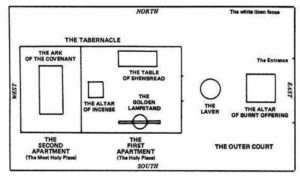 The writer to Hebrews reviews the pattern of the tabernacle. He outlines the perfection of Christ’s priestly work as it is symbolically foreshadowed in the construction pattern of the tabernacle. In the outer court were the brazen laver and the brazen altar where the priests would wash, and the sacrifices were made. The central section of the tabernacle consisted of two rooms. The first was the Holy Place with the golden altar of incense, the table of shewbread, and the lampstand. There was a second room, the innermost sanctum, the Holiest of All, which was only accessible through a veil curtain on the east side from the holy place. Within that chamber was the ark of the covenant that housed the gold jar of manna, Aaron’s rod that budded, and the stone tables of the covenant law. Above the ark were the cherubim of gold whose eyes were upon the golden lid upon the chest containing the testimony of the Lord. This lid was called the mercy seat. The golden cherubim would look to see that God’s holy demands were satisfied, with the atoning blood being sprinkled on the mercy seat by the High Priest on the annual Great Day of Atonement. He dares not enter without the blood of the substitute, lest he be struck dead. The atonement offered was for his own sins as well as the sins of the people.
The writer to Hebrews reviews the pattern of the tabernacle. He outlines the perfection of Christ’s priestly work as it is symbolically foreshadowed in the construction pattern of the tabernacle. In the outer court were the brazen laver and the brazen altar where the priests would wash, and the sacrifices were made. The central section of the tabernacle consisted of two rooms. The first was the Holy Place with the golden altar of incense, the table of shewbread, and the lampstand. There was a second room, the innermost sanctum, the Holiest of All, which was only accessible through a veil curtain on the east side from the holy place. Within that chamber was the ark of the covenant that housed the gold jar of manna, Aaron’s rod that budded, and the stone tables of the covenant law. Above the ark were the cherubim of gold whose eyes were upon the golden lid upon the chest containing the testimony of the Lord. This lid was called the mercy seat. The golden cherubim would look to see that God’s holy demands were satisfied, with the atoning blood being sprinkled on the mercy seat by the High Priest on the annual Great Day of Atonement. He dares not enter without the blood of the substitute, lest he be struck dead. The atonement offered was for his own sins as well as the sins of the people.
 The very nature of these rituals reveal that they were in themselves representative of something more perfect to come. There was no provision for abiding year-round in the presence of the Lord and living in the light of His glory. The priest could not remain in the Holiest of All, and there was no witness to the human conscience that the sacrifices could in themselves deal with their sins.
The very nature of these rituals reveal that they were in themselves representative of something more perfect to come. There was no provision for abiding year-round in the presence of the Lord and living in the light of His glory. The priest could not remain in the Holiest of All, and there was no witness to the human conscience that the sacrifices could in themselves deal with their sins.
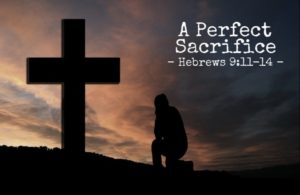 These Old Testament sacrifices were ‘place holders’ for the perfect sacrifice to come, that of Jesus Christ. He is the anti-type for all the types. He is the substance for which all these elements in the tabernacle were but the shadow. The tabernacle served as a menu for the real meal to come- The Bread of Life.
These Old Testament sacrifices were ‘place holders’ for the perfect sacrifice to come, that of Jesus Christ. He is the anti-type for all the types. He is the substance for which all these elements in the tabernacle were but the shadow. The tabernacle served as a menu for the real meal to come- The Bread of Life.
TODAY’S READING FROM THE BOOK OF PSALMS- PSALMS 106:32-48
Psalm 106 continues to call for the praise of God, considering His mercies towards His people who so often provoked Him to anger. They rebelled against the Spirit of God at Meribah. The people murmured about Moses, the manna, and their having to remain desperately dependent upon God. Even Moses lost his temper, misrepresenting the holiness of God to his people.
In the Promised Land, each tribe fell short of obedience, failing to drive out the enemy.
The Lord took note of their distress when he heard their cry despite their persistent idolatry and violence. He did this because of His unconditional covenant to bless the seed of Abraham. Through the seed of Abraham (Christ), His demands for holiness would be satisfied.
Psalm 106:45 45 And He remembered His covenant for their sake, and relented according to the greatness of His lovingkindness.
The Psalm closes with a call for salvation (106:47) and a call for praise to the Lord God of Israel from everlasting to everlasting!
Psalm 106:47 47 Save us, O LORD our God, And gather us from among the nations, To give thanks to Your holy name and glory in Your praise.
TODAY’S READING FROM THE BOOK OF PROVERBS – PROVERBS 27:10
Proverbs 27:10 10 Do not forsake your own friend or your father’s friend, and do not go to your brother’s house in the day of your calamity; Better is a neighbor who is near than a brother far away.
A friend who is available is better than a relative who is not. The same can be said of an available neighbor. We should do our best to cultivate healthy relationships with them all, friends, family and neighbor.
The Apostle Paul expressed a similar thought in his letter to the Romans:
Romans 12:18 18 If possible, so far as it depends on you, be at peace with all men.
PRAY FOR THE NATIONS – SUDAN (from “Operation World Prayer Guide)
Republic of Sudan
Africa
Geography
Africa’s largest country. Desert in the north, merging into grasslands and mountains in the center and tropical bush in the south. Straddling the Nile Rivers. Nuba Mountains in the center.
Population: 35,700,000 Annual Growth: 2.22%
Capital: Khartoum
Urbanites: 33.3%
HDI Rank: 171 of 182 (UN Human Development Reports 2009)
Peoples
 Peoples: 165All peoples
Peoples: 165All peoples
Unreached Peoples Prayer Card
Official language: Arabic and English Languages: 75 All languages
Religion
Largest Religion: Muslim
|
Religion |
|
Pop % |
Ann Gr |
|
2,600,000 |
7.20 |
0.0 |
|
|
1,900,000 |
5.2 |
0.0 |
Challenges for Prayer
Pray for the Church in Sudan Believers must find ways to recover from the damage done by war and persecution. This includes both the physical damage from bombing, fire, and poverty, but also the spiritual and emotional trauma caused by such prolonged pain. Possibly the most strategic need is training Spiritual leaders and pastors need training that suits the Sudanese context. In addition, the millions who came to Jesus from Islamic, animist, or weak Christian backgrounds need discipleship. Out of 114 languages, only 10 have the whole Bible. Christian radio/audio resources and TV/video material could help believers read and understand Scripture, gain a Christian worldview, and learn how to reach their neighbors (even their enemies!) for Jesus.
PRAYER– Father, thank You for giving us access into Your presence through the mediation of our Faithful, Eternal, High Priest and King, the Lord Jesus Christ. Your Holy Spirit encourages us to draw near with our consciences cleansed because of the shed blood of Jesus. We come to You by a new and living way. We ask that You purify our hearts, cleanse our spirits and renew our minds so that our lives would not be tainted by the defilement of this world’s lies and idolatries. We rejoice knowing that we can rest in the perfect provision of Christ’s perfect sacrifice. Empower us to extend to others the great grace we have received. In Jesus’ Name.
-Pastor David

